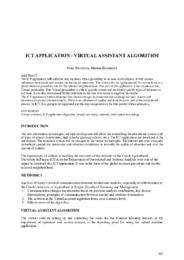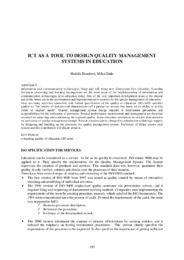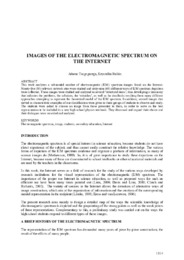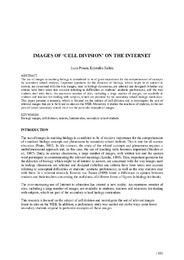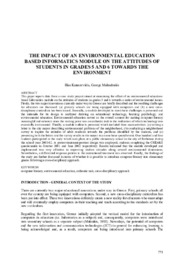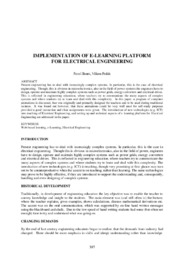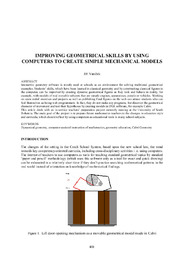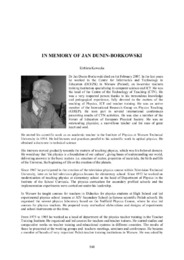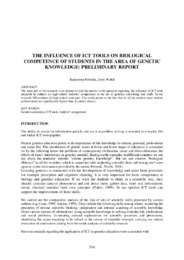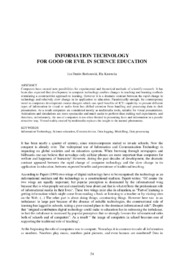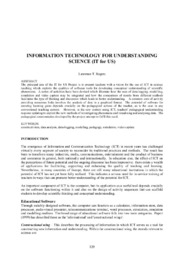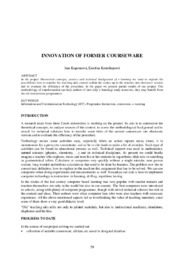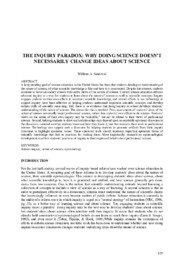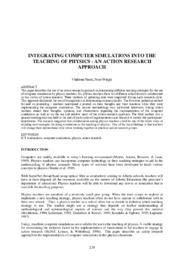Browsing Computer Based Learning in Science (CBLIS) by Title
Now showing items 134-153 of 337
-
ICT application - virtual assistant algorithm
(Department of Educational Sciences, University of Cyprus, 2003)The ICT application will cultivate new methods, with a possibility to be used in all subjects. It will contain influences from inside and outside the faculty or university. The scheme for the application ICT is in the form ... -
ICT as a tool to design quality management systems in education
(University of Zilina, 2005)Information and communication technologies bring and will bring new dimensions into education. Learning document processing and learning management are the main areas of the implementation of information and communication ... -
ICT in science teaching Investigating the spreadsheets integration Into science teaching to promote both curriculum aims and science skills via ict strands
(Department of Educational Sciences, University of Cyprus, 2003)Spreadsheets can be implemented into Science teaching as learning tools. The issue is that whether such ICT integration (Spreadsheets) into science teaching can facilitate both the: a) Promotion of specific curriculum aims ... -
ICT supported educational module for Preservation of existing ecosystem
(University of Cyprus, 2007)Increasing undergraduate students’ understanding of our ecosystems by way of ICT (Information and Communication Technologies) is rather important for the sustainability and future of our world. With this aim, ICT supported ... -
Images of the electromagnetic spectrum on the internet
(Department of Educational Sciences, University of Cyprus, 2003)This work analyzes a substantial number of electromagnetic (E/M) spectrum images found on the Internet. Ninety-five (95) relevant network sites were studied and sixty-nine (69) different ways of E/M spectrum depiction were ... -
Images of ‘cell division’ on the internet
(Department of Educational Sciences, University of Cyprus, 2003)The use of images in teaching biology is considered to be of great importance for the comprehension of concepts by secondary school students. Important questions for the didactics of biology, which might be of interest to ... -
The impact of αn environmental education Based informatics module on the attitudes of students in grades 5 and 6 towards the environment
(Department of Educational Sciences, University of Cyprus, 2003)This paper reports data from a case study project aimed at examining the effect of an environmental educationbased Informatics module on the attitudes of students in grades 5 and 6 towards a series of environmental issues. ... -
Implementation of e-learning platform for electrical engineering
(University of Zilina, 2005)Present engineering has to deal with increasingly complex systems. In particular, this is the case of electrical engineering. Though, this is obvious in microelectronics, also in the field of power systems the engineers ... -
Improving geometrical skills by using Computers to create simple mechanical models
(University of Cyprus, 2007)Interactive geometry software is mostly used at schools as an environment for solving traditional geometrical examples. Students’ skills, which have been learned in classical geometry and by constructing classical figures ... -
Improving learning outcomes through the Utilization of next generation e-learning Technologies
(University of Cyprus, 2007)Educational practice has in recent times been experiencing significant transitions. The ‘sage on a stage’ models of learning are slowly shifting to those of learning facilitation; that is the ‘guide on the side’ paradigm. ... -
In Memory Of Jan Dunin-Borkowski
(University of Cyprus, 2007) -
The influence of ict tools on biological competence of students in the area of genetic knowledge: preliminary report
(University of Zilina, 2005)The main aim of the research is an attempt to find the answer to the question regarding the influence of ICT tools prepared by authors on high school students’ competence in the are of genetics knowledge and skills. In the ... -
Information and communication technology; First-aid to the private tutoring problem?
(Department of Educational Sciences, University of Cyprus, 2003)In the past pupils at the elementary and high schools were only complaining about homework. Nowadays they must be rightfully complaining about private tutoring. Private tutoring has been seen by many as the plague of our ... -
Information technology for good or evil in science education
(Department of Educational Sciences, University of Cyprus, 2003)Computers have created new possibilities for experimental and theoretical methods of scientific research. It has been also expected that development in computer technology enables changes in teaching and learning methods ... -
Information technology for understanding Science (it for us)
(University of Cyprus, 2007)The principal aim of the IT for US Project is to present teachers with a vision for the use of ICT in science teaching which exploits the qualities of software tools for developing conceptual understanding of scientific phenomena. ... -
Innovation of former courseware
(University of Zilina, 2005)In the project Theoretical concepts, sources and technical background of e-learning we want to explore the possibilities how to transfer the teaching aids created within the sixties up to the nineties into electronic version ... -
The inquiry paradox: why doing science doesn't necessarily change ideas about science
(Department of Educational Sciences, University of Cyprus, 2003)A long standing goal of science education in the United States has been that students develop an understanding of the nature of science, of what scientific knowledge is like and how it is constructed. Despite this interest, ... -
Inquiry-based activities using a variety of Pedagogical tools
(University of Cyprus, 2007)This study examined the impact of an inquiry-based and modeling-based instructional intervention on primary school students, using different pedagogical tools: video, real objects and a technology-based environment ... -
Instructional software programs used in the Romanian higher education system
(Department of Educational Sciences, University of Cyprus, 2003)The social and political framework from Romania and the new technological revolution issued a revolution in the Romanian education system. There were initiated new forms of education and new instruction fields. Software ... -
Integrating computer simulations into the teaching of physics - an action research approach
(University of Zilina, 2005)This paper describes the use of an action research approach in determining different teaching strategies for the use of computer simulations by physics teachers. Six physics teachers from two different school districts ...
